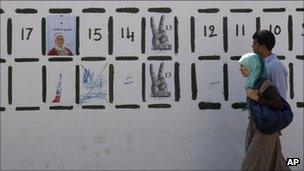Campaigning begins for landmark elections in Tunisia
- Published

Dozens of parties have been registered since the toppling of Zine al-Abidine Ben Ali
Campaigning has begun in Tunisia for the first elections since the revolution in January that sparked protests across the Arab world.
More than 80 political parties are competing in the 23 October polls, which will elect an assembly to draft a new constitution.
President Zine al-Abidine Ben Ali, who ruled autocratically for 23 years, was toppled in January.
Tunisia's so-called Jasmine Revolution inspired uprisings across the region.
Undecided voters
"The elections should take place under favourable conditions, but we are ready for any eventuality," Kamel Jendoubi, the head of the commission overseeing elections, told AP news agency.
The polls will see up to 7 million registered voters choose a 217-member assembly which will oversee the writing of the country's new constitution.
They had initially been set for July but were postponed after the election commission said it needed more time to prepare.
The European Union is sending 150 observers to Tunisia to oversee the process.
"We have no concerns for the security of the electoral process, and we have a lot of reason to be optimistic," Michael Gahler, the head of the European observer mission, said on a visit to the country.
Half of Tunisians remain undecided of who to vote for, three weeks ahead of the poll, according to Reuters news agency.
The BBC's Chloe Arnold says most parties are introducing themselves for the first time, but that Ennahda, a moderate Islamist group, is expected to win the biggest share of votes.
The main contest is between the Islamists, who want religion to play a greater part in public life and secularists who think Islam should be confined to mosques, she says.
The revolt in Tunisia, which used social networking to organise rallies, inspired similar anti-government uprisings in Egypt, Libya, Syria, Yemen, and others, in a movement which became known as the Arab Spring.